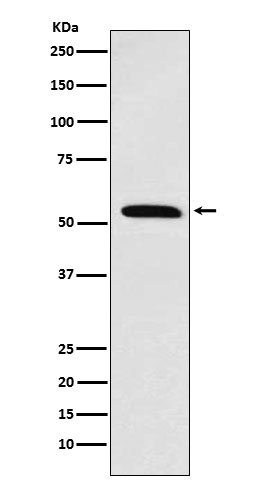Retinoid X Receptor alpha Rabbit mAb [JkG0]Cat NO.: A64194
Western blot(SDS PAGE) analysis of extracts from K562 cell lysate.Using Retinoid X Receptor alpha Rabbit mAb [JkG0]at dilution of 1:1000 incubated at 4℃ over night.
Product information
Protein names :NR2B1; RXR alpha1; Rxra; RXRalpha1;
UniProtID :P19793
MASS(da) :50,811
MW(kDa) :51kDa
Form :Liquid
Purification :Affinity-chromatography
Host :Rabbit
Isotype : IgG
sensitivity :Endogenous
Reactivity :Human,Mouse,Rat
- ApplicationDilution
- 免疫印迹(WB)1:1000-2000
- 免疫荧光(ICC/IF)1:100
- The optimal dilutions should be determined by the end user
Specificity :Antibody is produced by immunizing animals with A synthesized peptide derived from human Retinoid X Receptor alpha
Storage :Antibody store in 10 mM PBS, 0.5mg/ml BSA, 50% glycerol. Shipped at 4°C. Store at-20°C or -80°C. Products are valid for one natural year of receipt.Avoid repeated freeze / thaw cycles.
WB Positive detected :K562 cell lysate.
Function : Receptor for retinoic acid that acts as a transcription factor (PubMed:11162439, PubMed:11915042). Forms homo- or heterodimers with retinoic acid receptors (RARs) and binds to target response elements in response to their ligands, all-trans or 9-cis retinoic acid, to regulate gene expression in various biological processes (PubMed:10195690, PubMed:11162439, PubMed:11915042, PubMed:28167758, PubMed:17761950, PubMed:16107141, PubMed:18800767, PubMed:19167885). The RAR/RXR heterodimers bind to the retinoic acid response elements (RARE) composed of tandem 5'-AGGTCA-3' sites known as DR1-DR5 to regulate transcription (PubMed:10195690, PubMed:11162439, PubMed:11915042, PubMed:17761950, PubMed:28167758). The high affinity ligand for retinoid X receptors (RXRs) is 9-cis retinoic acid (PubMed:1310260). In the absence of ligand, the RXR-RAR heterodimers associate with a multiprotein complex containing transcription corepressors that induce histone deacetylation, chromatin condensation and transcriptional suppression (PubMed:20215566). On ligand binding, the corepressors dissociate from the receptors and coactivators are recruited leading to transcriptional activation (PubMed:20215566, PubMed:9267036). Serves as a common heterodimeric partner for a number of nuclear receptors, such as RARA, RARB and PPARA (PubMed:10195690, PubMed:11915042, PubMed:28167758, PubMed:29021580). The RXRA/RARB heterodimer can act as a transcriptional repressor or transcriptional activator, depending on the RARE DNA element context (PubMed:29021580). The RXRA/PPARA heterodimer is required for PPARA transcriptional activity on fatty acid oxidation genes such as ACOX1 and the P450 system genes (PubMed:10195690). Together with RARA, positively regulates microRNA-10a expression, thereby inhibiting the GATA6/VCAM1 signaling response to pulsatile shear stress in vascular endothelial cells (PubMed:28167758). Acts as an enhancer of RARA binding to RARE DNA element (PubMed:28167758). May facilitate the nuclear import of heterodimerization partners such as VDR and NR4A1 (PubMed:12145331, PubMed:15509776). Promotes myelin debris phagocytosis and remyelination by macrophages (PubMed:26463675). Plays a role in the attenuation of the innate immune system in response to viral infections, possibly by negatively regulating the transcription of antiviral genes such as type I IFN genes (PubMed:25417649). Involved in the regulation of calcium signaling by repressing ITPR2 gene expression, thereby controlling cellular senescence (PubMed:30216632)..
Tissue specificity :Expressed in lung fibroblasts (at protein level) (PubMed:30216632). Expressed in monocytes (PubMed:26463675). Highly expressed in liver, also found in kidney and brain (PubMed:24275569, PubMed:2159111, PubMed:14702039)..
Subcellular locationi :Nucleus. Cytoplasm. Mitochondrion.
IMPORTANT: For western blots, incubate membrane with diluted primary antibody in 1% w/v BSA, 1X TBST at 4°C overnight.


